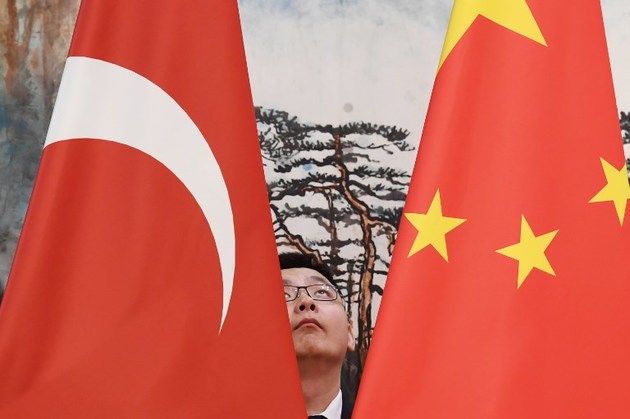A Turkish-US business council is projecting Turkey as a trading alternative to China with the help of influential Republican Senator Lindsey Graham, a close associate of President Donald Trump. Asia Times reports in its article Made in Turkey? US ally seeks to edge out China that Graham’s agreement to participate in a Wednesday webinar organized by the Turkey American Business Council (TAIK), an affiliate of the Foreign Economic Relations Board of Turkey, the country’s oldest and largest business association, comes amid Turkish efforts to improve relations with the United States as a hedge to its ties to Russia.
“The growing rift between the United States and China creates significant opportunity for geopolitical cooperation. Turkey and the United States would both benefit economically,” said a Turkish businessman. Criticism of China’s handling of the coronavirus pandemic has widened the gap between Washington and Beijing and sparked calls for diversification of China-centric global supply chains. It has also raised hopes in Ankara, suffering its first economic contraction in a decade, that the decoupling of the US and China could create common interests between the US and Turkey. “The pre-pandemic global economy was built on a single supply chain, with China at its core,” said Turkish Vice-President Fuat Oktay in May. “For countries like Turkey, with our robust manufacturing sector and our young population, this will be an economic opportunity,” he added.
Halkbank prosecutor fired
Turkish relations with the United States have in recent years been strained by the NATO member’s acquisition of Russia’s S-400 anti-missile defense system, the presence in the US of a Turkish preacher whom Erdogan holds responsible for a failed 2016 military coup against him, and legal proceedings against a state-owned Turkish bank, Halkbank, charged with circumventing US sanctions against Iran.
Turkish efforts to improve relations with Washington come amid a series of perceived breakthroughs. On Monday, shares in Halkbank went up 9% after the US federal prosecutor overseeing the court case against the bank was fired by staunch Trump ally, Attorney General William Barr.
Divergences in the Middle East also appear to be easing. Military victories of the Turkey-backed Libyan government are expected to dampen US enthusiasm for the rogue commander Khalifa Haftar. Turkey has also moved to improve long-strained relations with America’s top Middle East ally Israel. Ankara last month authorized twice-weekly cargo flights by El Al, Israel’s national carrier, between Istanbul and Tel Aviv. Two of those flights ferried medical supplies from Turkey to the United States. The flights to Turkey were El Al’s first in 10 years.
Erdogan is banking on his personal relationship with Trump that in the past has produced White House decisions that overrode opposition from the Pentagon and other branches of his government.
First and foremost was Trump’s acquiescence to Erdogan’s request last year for a pullback of US troops in northern Syria that paved the way for a Turkish military incursion against Kurdish forces. Erdogan again sought to capitalize on his relationship with Trump in a June 9 phone call. “To be honest, after our conversation tonight, a new era can begin between the United States and Turkey,” Erdogan said without offering further details.
Gateway to Africa
Erdogan spoke to Trump as Turkey was projecting itself as an important US trading partner. The June 24 TAIK webinar, entitled ‘A Time for Allies to be Allies: Turkish American Global Supply Chain,’ in which Senator Graham is scheduled to speak alongside former US Senator David Vitter of Louisiana, is part of an effort to position Turkey as a key player in reducing US dependence on Chinese supply chains.
Foreign Lobby Report, a Washington-based online news service, reported that TAIK, working with lobbying firm Mercury Public Affairs, had approached Graham in March with the proposition that Turkey could serve as the United States’ gateway to Africa. “As we strive to move forward, we at TAIK are already contemplating how we can reignite the economy post-pandemic,” TAIK chairman Mehmet Ali Yalcindag wrote in a letter to Graham. “Joint ventures in Africa could be an exciting part of this plan. Not only would we be helping fragile economies that will need assistance in recovering, but we also would be striking a blow against Chinese designs in Africa and forging closer economic ties between Turkey and the US.”
Yalcindag recommended in a separate letter last month to US Commerce Secretary Wilbur Ross “an initial focus on LNG (liquified natural gas) and agriculture imports from the US.” “At the same time, Turkey could boost exports of white goods and automotive parts — diversifying America’s supply chain away from China, a stated goal of the Trump Administration.”
Pointing to the fact that US retail giant Walmart had already started sourcing products in Turkey, Yalcindag added: “Now is the time to reinforce the climate of cooperation and solidarity, China-dependent firms in the supply chain are … turning their eyes to different countries, Turkey being among them.”
Vitter, the former senator scheduled to speak in the TAIK webinar, backs a push by Louisiana Natural Gas Exports Inc to provide Turkey with “long-term, secure, competitively priced access to Turkey’s LNG terminals, gas pipeline and storage facilities” that would make the country less dependent on Russian and Iranian imports.
The push came as Botas, Turkey’s state-owned gas grid operator, opened a tender for the construction of a pipeline to Nakhichevan, an Azerbaijani exclave in Armenia. The pipeline would allow Azerbaijan, an ally of Turkey, to reduce imports from Iran, aligning Turkey and American interests.






